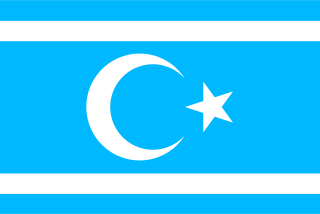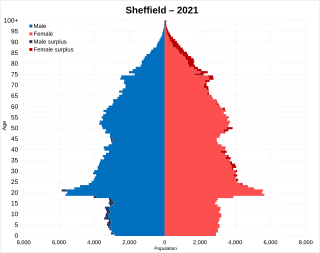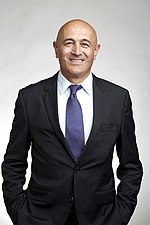
The Iraqi people are people originating from the country of Iraq.

Kirkuk is a city in Iraq, serving as the capital of the Kirkuk Governorate, located 238 kilometres north of Baghdad. The city is home to a diverse population of Kurds, Turkmens and Arabs. Kirkuk sits on the ruins of the original Kirkuk Citadel which sits near the Khasa River.
Minorities in Iraq include various ethnic and religious groups.

Iraqis are people who originate from the country of Iraq. Iraq is a multiethnic society, which means that it is home to people of many ethnic origins, and there is no correlation between one's stock and their Iraqi identity.
Religion in Iraq dates back to Ancient Mesopotamia, particularly Sumer, Akkad, Assyria and Babylonia between circa 3500 BC and 400 AD, after which they largely gave way to Syriac Christianity and later to Islam.

The Iraqi Turkmen, also referred to as Iraqi Turks, Turkish-Iraqis, the Turkish minority in Iraq, and the Iraqi-Turkish minority are Iraq's third largest ethnic group.

The latest (2021) population estimate for the City of Sheffield is 554,401 residents. This represents an increase of about 17,000 people since the last census in 2011.
Iraqi Americans are American citizens of Iraqi descent. As of 2015, the number of Iraqi Americans is around 145,279, according to the United States Census Bureau.

The Christians of Iraq are considered to be one of the oldest continuous Christian communities in the world.
Iraqi Australians are Australian citizens who identify themselves to be Iraqi descent. Since the 1991 Gulf War, thousands of Iraqis have found refuge in Australia. The total of population is estimated to be as high as 95,000. A Considerable part of Australia's Iraqi-born population doesn't claim Iraqi ancestry with most being Assyrian.

British Arabs are British citizens of Arab descent. They share a common Arab ethnicity, culture, language and identity from different Arab countries. Arabs also come from non-Arab countries as ethnic minorities.
Iranians in the United Kingdom or British Iranians consist of people of Iranian nationality who have settled in the United Kingdom, as well as British residents and citizens of Iranian heritage. Iranians in the United Kingdom are referred to by hyphenated terms such as British-Iranians, British-Persians, Iranian-Britons, or Persian-Britons. At the time of the 2011 census, 84,735 Iranian-born people resided in the UK. In 2017, the Office for National Statistics estimated the Iranian-born population to be 70,000.
British Moroccans are citizens and/or residents of the United Kingdom whose ethnic origins lie fully or partially in Morocco.

Ethnic groups in the Middle East, in the 'transcontinental' region which is commonly a geopolitical term designating the intercontinental region comprising West Asia without the South Caucasus, and also comprising Egypt in North Africa. The region has historically been a crossroad of different cultures and languages. Since the 1960s, the changes in political and economic factors have significantly altered the ethnic composition of groups in the region. While some ethnic groups have been present in the region for millennia, others have arrived fairly recently through immigration. The largest socioethnic groups in the region are Arabs, Turks, Persians, Kurds, and Azerbaijanis but there are dozens of other ethnic groups that have hundreds of thousands, and sometimes millions of members.
British Afghans are British citizens and non-citizen residents born in or with ancestors from, Afghanistan, part of worldwide Afghan diaspora. The Office for National Statistics (ONS) estimates that there were 79,000 people born in Afghanistan living in the UK in 2019.
Algerians in the United Kingdom are residents of the UK with ancestry from Algeria. They include Algerian-born immigrants and their British-born descendants.
Nemir Amin Kirdar was an Iraqi banker, billionaire, businessman, financier and author. As a founding father of private equity, and an economic and cultural bridge-builder, he was the founder and CEO of Investcorp, a global alternative investment group that operates in Manama, New York, London, Abu Dhabi, Riyadh, Doha and Singapore. He spent much of his life in London, and held British citizenship. He was of Iraqi Turkmen background from Kirkuk.
Congolese in the United Kingdom consist of immigrants from the Democratic Republic of the Congo (DRC) living in the United Kingdom as well as their British-born descendants. The demonym Congolese can also refer to people from the Republic of Congo, of whom there are fewer living in the UK.
Sudanese in the United Kingdom including Sudanese-born immigrants to the UK and their British-born descendants are an extremely diverse national group, especially in terms of political and religious views. It is thought that the UK is home to the oldest Sudanese diaspora in the Western World, as well as one of the largest. Sudanese migrants to the UK have traditionally included professionals, business people and academics, and more recently have included asylum seekers fleeing Sudan's second civil war. Sudanese people live in many of the UK's largest cities and towns.










